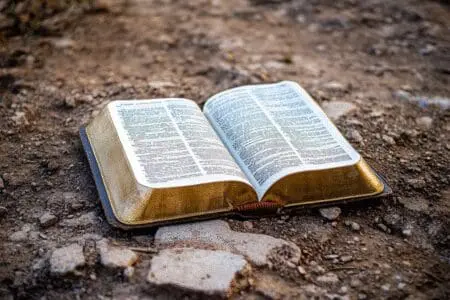Have you ever sat down to read the Bible and just felt… overwhelmed? I know I have. It’s this massive collection of books written over thousands of years, and sometimes it feels like a puzzle with a thousand missing pieces. For years, I found myself wondering, if I could just ask one person what it’s all really about, who would it be? The answer seemed obvious: Jesus. His name is on the cover of the best-selling book of all time, after all. That sent me down a rabbit hole, digging through the Gospels, trying to answer a very specific question: What did Jesus say about the Bible?
It turns out, finding the answer is a bit more complicated than just looking up a verse. He didn’t hold up a leather-bound King James Version and say, “Read this.” The “Bible” as we know it didn’t even exist yet. But he talked about Scripture constantly. He quoted it, argued from it, and claimed to be the fulfillment of it. Sorting through his actual words, separated from centuries of tradition and interpretation, felt like a real investigation. This isn’t a theological deep-dive from a scholar in an ivory tower; it’s just the honest account of what I found when I went looking for myself.
More in Bible Category
What Bible Do Eastern Orthodox Use
Key Takeaways
For those who want the short version, here’s what I discovered. This is the stuff that really stuck with me:
- Jesus’s “Bible” was the Old Testament. When Jesus referred to “the Scriptures,” he meant the Hebrew texts we now call the Old Testament—specifically the Law, the Prophets, and the Writings. The New Testament hadn’t been written yet.
- He treated it as God’s Word. Jesus consistently referred to Scripture as authoritative and divinely inspired. He used phrases like “Have you not read what was spoken to you by God?” when quoting the Old Testament. For him, the words of Scripture were the words of God.
- He believed it all pointed to him. This was the biggest takeaway for me. Jesus didn’t see the Scriptures as just a rulebook or a history text. He saw it as one long story that had him as its grand finale.
- He used it to fight temptation and challenge others. In the wilderness, his only weapon against Satan was quoting Scripture. With the religious leaders, he used his deep knowledge of the text to expose their hypocrisy and correct their misunderstandings.
- He wasn’t afraid to challenge human interpretations. While he held Scripture in the highest regard, Jesus often pushed back against the man-made rules and traditions that had been built up around it, famously saying, “You have heard that it was said… But I say to you…”
First Off, Did Jesus Even Have a ‘Bible’?
It’s a fair question, right? When I picture Jesus, he’s usually walking through dusty fields, not sitting in a library. The idea of him carrying around a thick book seems out of place. And it is. The single-book “Bible” with a table of contents, chapters, and verses is a much later invention.
In the first century, the Jewish people had the Holy Scriptures, but they were a collection of individual scrolls. Think of it like a shelf of records instead of a single Spotify playlist. These scrolls contained what Christians now call the Old Testament.
What Was on Those Scrolls?
When people went to the synagogue, they would hear readings from these sacred texts. They were meticulously copied by hand and considered the very words of God. Jesus, growing up in a devout Jewish home, would have heard these texts read aloud his entire life. He didn’t just read them; he breathed them.
The collection was generally organized into three main parts:
- The Law (Torah): The first five books—Genesis, Exodus, Leviticus, Numbers, and Deuteronomy. This was the foundation of Jewish life and faith.
- The Prophets (Nevi’im): This included the historical books like Joshua and Judges, as well as the messages of prophets like Isaiah, Jeremiah, and Ezekiel.
- The Writings (Ketuvim): A collection of poetry, wisdom, and history, including Psalms, Proverbs, Job, and Chronicles.
So when Jesus talked about “the Scripture,” this is what he was referring to. It was the air he breathed, the foundation of his worldview, and the story he knew he was a part of.
Okay, So How Did He Actually View Scripture? Did He Think It Was Flawless?
This is where it gets really interesting. It’s one thing to say he read the scrolls, but what was his attitude toward them? Did he see them as a collection of helpful suggestions, or something more?
I remember trying to assemble a piece of furniture once with instructions that were clearly translated poorly. I got the gist, but I had to improvise a lot. At one point, I just tossed them aside and finished it based on the picture on the box. I wondered if Jesus treated Scripture like that—a helpful guide, but one you could deviate from.
The evidence points in the complete opposite direction. Jesus treated the Scriptures with a level of reverence that is almost startling.
He Saw It as God’s Direct Word
Jesus didn’t just see the Bible as containing words about God; he saw it as containing the very words of God. Look at how he phrases things. In Matthew 19, when the Pharisees question him about divorce, Jesus answers by quoting from Genesis: “Have you not read that he who created them from the beginning made them male and female…?”
He then treats that quote from a historical book as the direct, authoritative word of the Creator himself. He saw the human author as a vessel for a divine message. For Jesus, when Scripture speaks, God speaks.
He Believed It Was Unbreakable and Eternal
There’s a powerful statement he makes in his most famous sermon, the Sermon on the Mount. He says:
“For truly, I say to you, until heaven and earth pass away, not an iota, not a dot, will pass from the Law until all is accomplished.” (Matthew 5:18)
An “iota” was the smallest letter in the Greek alphabet, and a “dot” was a tiny mark used to distinguish one Hebrew letter from another. He was essentially saying that not even the smallest, most insignificant punctuation mark of Scripture would fail. He believed it was more permanent than the universe itself. That doesn’t sound like someone who saw the text as flexible or optional.
But Didn’t He Break the Rules Sometimes?
This was a big hang-up for me. I’d read stories about him healing on the Sabbath, which was a huge no-no according to the religious leaders. Or I’d hear him say things like, “You have heard it was said, ‘An eye for an eye and a tooth for a tooth.’ But I say to you, Do not resist the one who is evil.” (Matthew 5:38-39).
It sounds like he’s contradicting the Old Testament, right?
Correcting Traditions, Not Scripture
I spent a lot of time on this, and what I realized is that Jesus never, ever broke the actual written Word of God. What he broke were the human traditions and interpretations that had been piled on top of Scripture for centuries.
The religious leaders had created a complex web of extra rules, a “hedge” around the Law, to keep people from even getting close to breaking it. The problem was, they started treating their hedge as being more important than the Law itself.
When Jesus healed on the Sabbath, he wasn’t breaking the command to rest. He was breaking their man-made definition of what “work” was. He was arguing that showing mercy and restoring a person’s life was the very essence of the Sabbath, not a violation of it. He was getting back to the original intent of the Law, which they had lost in their rule-making.
So, What Was the Main Point of the Bible for Him?
If you asked a hundred people today what the Bible is for, you’d get a hundred different answers. It’s a moral guide. It’s a history book. It’s a source of comfort. It’s a weapon for arguments.
Jesus had a laser-focused answer, and it’s probably the most important thing I learned in this whole process.
It’s All About Him
For Jesus, the entire Old Testament was a giant, divinely inspired arrow pointing directly at him. He saw himself as the main character of the story, the one that all the laws, prophecies, and poems were hinting at.
He says this in the most direct way possible to the religious experts of his day:
“You search the Scriptures because you think that in them you have eternal life; and it is they that bear witness about me, yet you refuse to come to me that you may have life.” (John 5:39-40)
Can you imagine the audacity? He’s telling the people who had dedicated their entire lives to studying the Bible that they had missed the entire point. They were studying the map so intently that they didn’t recognize the destination when he was standing right in front of them. For an in-depth look at what the “Bible” consisted of in this period, the Duke Divinity School offers a helpful brief on what the Bible was that Jesus read.
Fulfilling the Story
After his resurrection, Jesus walks along a road with two of his devastated followers who don’t recognize him. They are confused because the man they thought was the savior had been executed.
What does Jesus do? He gives them a Bible study.
“And beginning with Moses and all the Prophets, he interpreted to them in all the Scriptures the things concerning himself.” (Luke 24:27)
He went back to the very beginning, to the scrolls they had known their whole lives, and showed them how his own life, death, and resurrection were the fulfillment of the story. It wasn’t Plan B. It was the grand finale that had been planned from page one. For Jesus, the Bible wasn’t just a book of rules to follow; it was a story to be fulfilled. And he was the fulfillment.
What About the New Testament? What Did He Say About That?
This is the logical next question. If Jesus’s Bible was the Old Testament, what does that mean for the 27 books that came after him? He obviously couldn’t have quoted the Gospel of John or the book of Romans.
Does that make them less important? Less authoritative?
This is where you have to look not just at what he said, but at what he set in motion.
He Promised His Disciples He Would Guide Them
Jesus knew he wasn’t going to be on earth forever. He also knew his disciples, a bunch of fishermen and tax collectors, were not going to be able to remember everything he said and did perfectly on their own.
So he made them a promise. He told them he would send the Holy Spirit to them after he was gone.
“But the Helper, the Holy Spirit, whom the Father will send in my name, he will teach you all things and bring to your remembrance all that I have said to you.” (John 14:26)
He gave his hand-picked apostles his authority to speak on his behalf. He told them, “Whoever receives you receives me” (Matthew 10:40). Christians believe that this divine guidance is what led to the writing of the Gospels and the letters that form the New Testament. They see these writings not just as the words of Peter, Paul, or John, but as the fulfillment of Jesus’s promise to guide his followers into all truth.
My Final Takeaway: It’s Not a Flat Book
Spending all this time just looking at Jesus’s own words about the Bible changed how I see it. I used to approach it like a flat text, where a verse in Leviticus carried the same weight in my daily life as a command from Jesus in Matthew.
But Jesus himself didn’t treat it that way.
He showed that while all of it is God’s Word, it’s not all the same. He summed up the entire Old Testament law by saying it all hangs on two commands: Love God and love your neighbor. He showed that the sacrificial system, the dietary laws, and the civil codes for ancient Israel were all shadows pointing to a new reality that he was bringing in.
He taught me that the Bible isn’t just a divine encyclopedia of facts. It’s a story. It has a plot, it builds, it has twists and turns, and it climaxes with him. When I read the Old Testament now, I’m not just reading ancient rules or disconnected stories. I’m reading the book that Jesus read. I’m looking for the things that point to him, the promises that he fulfilled, and the character of the God he came to reveal.
It’s still a massive, overwhelming book. But now, at least, I feel like I have the key. I know what—or rather, who—it’s all about.
Frequently Asked Questions – What Did Jesus Say About the Bible

What was Jesus’ stance on the misuse of the Bible and tradition?
Jesus strongly condemned misusing scripture to control people or substitute human traditions for God’s commands, emphasizing that love and justice are the core of God’s law.
How did Jesus interpret the Old Testament in relation to His own life?
Jesus saw the Old Testament as pointing to Him; He explained that it was about His life, death, and role as the promised Messiah, fulfilling prophecy and law.
Did Jesus believe the smallest details of the Bible were important?
Yes, Jesus emphasized that not even the smallest letter or stroke of a pen would disappear from the law until everything was fulfilled, indicating a high regard for every detail of scripture.
How did Jesus demonstrate that the Bible was God’s direct Word?
Jesus frequently quoted scripture to stand against temptation and to answer religious questions, showing he believed every part of the Bible was inspired by God and reliable.
What was Jesus’ view of the Bible’s authority?
Jesus treated the Bible as God’s full and authoritative Word, always referring to it as the ultimate source of truth and authority in his teachings.




